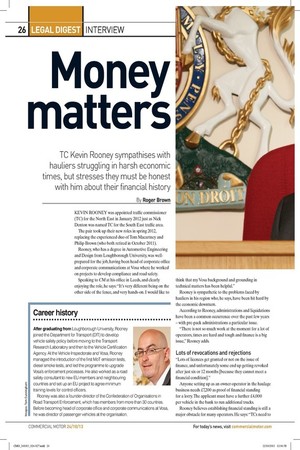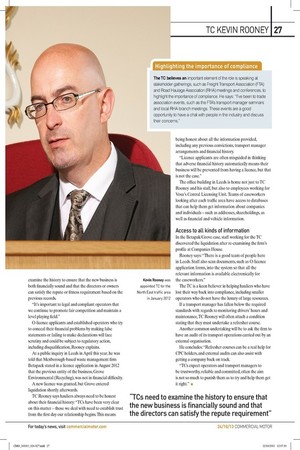Money matters
Page 20

Page 21

If you've noticed an error in this article please click here to report it so we can fix it.
TC Kevin Rooney sympathises with hauliers struggling in harsh economic times, but stresses they must be honest with him about their financial history By Roger Brown
KEVIN ROONEY was appointed traffic commissioner (TC) for the North East in January 2012 just as Nick Denton was named TC for the South East traffic area.
The pair took up their new roles in spring 2012, replacing the experienced duo of Tom Macartney and Philip Brown (who both retired in October 2011).
Rooney, who has a degree in Automotive Engineering and Design from Loughborough University, was wellprepared for the job, having been head of corporate office and corporate communications at Vosa where he worked on projects to develop compliance and road safety. Speaking to CM at his office in Leeds, and clearly enjoying the role, he says: "It's very different being on the other side of the fence, and very hands-on. I would like to
think that my Vosa background and grounding in technical matters has been helpful."
Rooney is sympathetic to the problems faced by hauliers in his region who, he says, have been hit hard by the economic downturn.
According to Rooney, administrations and liquidations have been a common occurrence over the past few years — with pre-pack administrations a particular issue.
"There is not so much work at the moment for a lot of operators, times are hard and tough and finance is a big issue," Rooney adds. Lots of revocations and rejections
"Lots of licences get granted or not on the issue of finance, and unfortunately some end up getting revoked after just six or 12 months [because they cannot meet a financial condition]."
Anyone setting up as an owner-operator in the haulage business needs £7,200 as proof of financial standing for a lorry. The applicant must have a further £4,000 per vehicle in the bank to run additional trucks. Rooney believes establishing financial standing is still a major obstacle for many operators. He says: "TCs need to
examine the history to ensure that the new business is both financially sound and that the directors or owners can satisfy the repute or fitness requirement based on the previous records.
"It's important to legal and compliant operators that we continue to promote fair competition and maintain a level playing field."
0-licence applicants and established operators who try to conceal their financial problems by making false statements or failing to make declarations will face scrutiny and could be subject to regulatory action, including disqualification, Rooney explains.
At a public inquiry in Leeds in April this year, he was told that Mexborough-based waste management firm Betapack stated in a licence application in August 2012 that the previous entity of the business, Grove Environmental (Recycling), was not in financial difficulty.
A new licence was granted, but Grove entered liquidation shortly afterwards. TC Rooney says hauliers always need to be honest about their financial history: "TCs have been very clear on this matter — those we deal with need to establish trust from the first day our relationship begins This means
being honest about all the information provided, including any previous convictions, transport manager arrangements and financial history.
"Licence applicants are often misguided in thinking that adverse financial history automatically means their business will be prevented from having a licence, but that is not the case."
The office building in Leeds is home not just to TC Rooney and his staff, but also to employees working for Vosa's Central Licensing Unit. Teams of caseworkers looking after each traffic area have access to databases that can help them get information about companies and individuals — such as addresses, shareholdings, as well as financial and vehicle information. Access to all kinds of information
In the Betapak/Grove case, staff working for the TC discovered the liquidation after re-examining the firm's profile at Companies House. Rooney says: "There is a good team of people here in Leeds. Staff also scan documents, such as 0-licence application forms, into the system so that all the relevant information is available electronically for
the caseworkers." The TC is a keen believer in helping hauliers who have lost their way back into compliance, including smaller
operators who do not have the luxury of large resources.
If a transport manager has fallen below the required standards with regards to monitoring drivers' hours and maintenance, TC Rooney will often attach a condition stating that they must undertake a refresher course.
Another common undertaking will be to ask the firm to have an audit of its transport operations carried out by an external organisation. He concludes: "Refresher courses can be a real help for CPC holders, and external audits can also assist with
getting a company back on track. "TCs expect operators and transport managers to be trustworthy, reliable and committed, often the aim is not so much to punish them as to try and help them get it right." is Career history
After graduating from Loughborough University, Rooney joined the Department for Transport (DfT) to develop vehicle safety policy before moving to the Transport Research Laboratory and then to the Vehicle Certification Agency. At the Vehicle Inspectorate and Vosa, Rooney managed the introduction of the first MoT emission tests, diesel smoke tests, and led the programme to upgrade Vosa's enforcement processes. He also worked as a road safety consultant to new EU members and neighbouring countries and set up an EU project to agree minimum training levels for control officers.
Rooney was also a founder-director of the Confederation of Organisations in Road Transport Enforcement, which has members from more than 30 countries. Before becoming head of corporate office and corporate communications at Vosa, he was director of passenger vehicles at the organisation. Highlighting the importance of compliance
The TC believes an important element of the role is speaking at stakeholder gatherings, such as Freight Transport Association (FTA) and Road Haulage Association (RHA) meetings and conferences, to highlight the importance of compliance. He says: "I've been to trade association events, such as the FTA's transport manager seminars and local RHA branch meetings. These events are a good opportunity to have a chat with people in the industry and discuss their concerns." "TCs need to examine the history to ensure that the new business is financially sound and that the directors can satisfy the repute requirement"








































